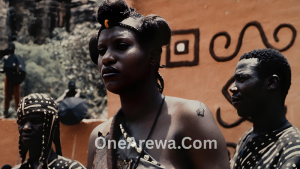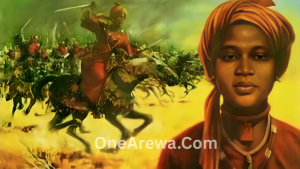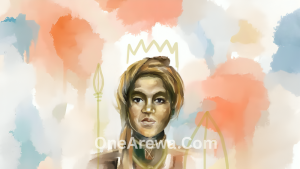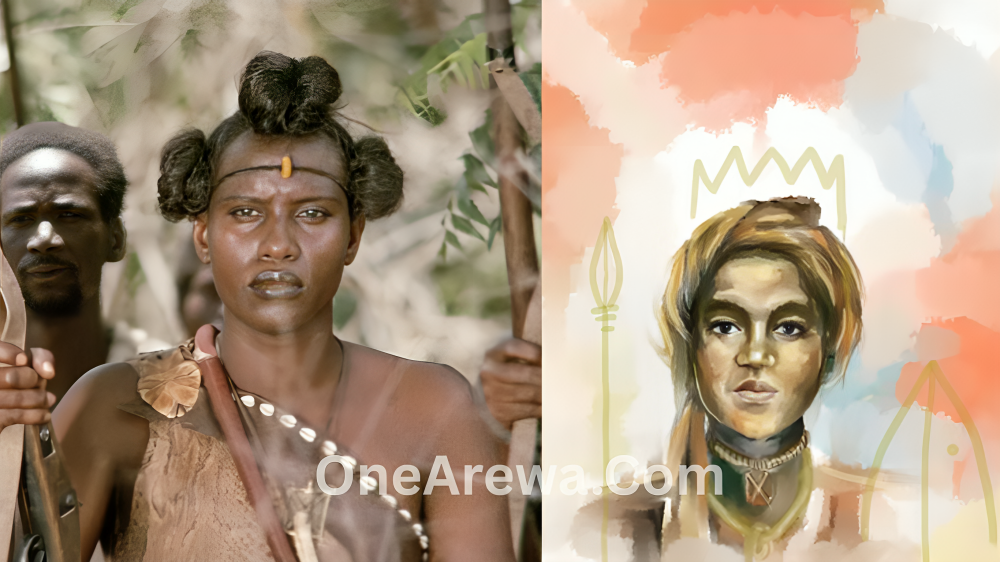Queen Sarraounia Mangou: The African Warrior Queen Who Defeated the French
Queen Sarraounia Mangou: The African Warrior Queen Who Defeated the French
Queen Sarraounia Mangou, born in the late 19th century, was a fearless Hausa warrior queen of the Azna people in Lougou, present-day Niger, who gained historical prominence in 1899 for her bold resistance against the French colonial Voulet, Chanoine Mission.
Known for her spiritual powers, military strategy, and unmatched bravery, Sarraounia led her people during the Battle of Lougou in 1899, where she successfully defeated the heavily armed French troops, becoming one of the few African leaders, and the only female monarch, to repel colonial conquest at the height of French imperial expansion in West Africa.
Her victory made her a national heroine and a symbol of African resistance, indigenous identity, and female empowerment, inspiring generations long after her reign, and her legacy was immortalized in the award-winning 1986 historical film “Sarraounia” directed by Med Hondo.

Queen Sarraounia Mangou Wiki Profile
| Category | Details |
|---|---|
| Full Name | Sarraounia Mangou |
| Title | Queen of Lougou |
| Meaning of Sarraounia | “Queen” in the Hausa language |
| Born | Late 19th century |
| Ethnicity | Hausa-Azna (non-Islamic/animist group) |
| Religion | Traditional African Religion (Azna spirituality) |
| Kingdom/Region | Lougou, Present-day Niger |
| Known For | Defeating French colonial forces in the Battle of Lougou |
| Famous Battle | Battle of Lougou – 1899 |
| Colonial Opponent | Voulet–Chanoine French Expeditionary Mission |
| Leadership Traits | Brave, strategic, spiritually empowered |
| Legacy | National heroine, anti-colonial resistance icon |
| Cultural Impact | Subject of the 1986 film Sarraounia by Med Hondo |
| Historical Rank | Among Africa’s most iconic warrior queens |
Check Out: Muhammad Yunfa: The King Who Tried to Stop Usman ɗan Fodio – And Lost a Kingdom

Queen Sarraounia Mangou’s Early Life and Background
Queen Sarraounia Mangou was born in the late 19th century into the Azna (animist) community in Lougou, a small Hausa-speaking region located in present-day Niger.
The term “Sarraounia” itself means “queen” in Hausa, and it was a title given to women rulers within Azna society.
Unlike many of the surrounding Hausa kingdoms that had adopted Islam, the Azna people held firmly to their traditional African religion, and Sarraounia was trained from a young age in both spiritual practices and military leadership.
She was believed to possess mystical powers, including the ability to invoke protection through rituals and charms, which gave her not only authority but fearsome respect among her people and enemies alike.
Her early exposure to warfare, diplomacy, and the sacred traditions of her people helped shape her into a formidable leader, both spiritually and politically, setting the foundation for her resistance against colonial domination later in life.

Queen Sarraounia Mangou Reign and Leadership
As the reigning Queen of Lougou in the 1890s, Sarraounia Mangou established herself as a powerful and independent ruler within the Azna confederation, governing with a combination of spiritual influence, military command, and political wisdom.
Her reign was marked by a strong commitment to protecting her people’s religious identity, cultural heritage, and territorial autonomy at a time when many surrounding regions were falling under French colonial rule.
Unlike other rulers who surrendered or collaborated with colonial invaders, Queen Sarraounia openly defied foreign domination, refusing to abandon the traditional beliefs of her people or submit to foreign governance.
She maintained a well-organized local army, cultivated alliances, and relied on both conventional warfare and spiritual warfare, using charms, rituals, and protective magic believed to empower her warriors.
Her leadership style was characterized by discipline, courage, and determination, making her not just a queen but a commander and national protector, fiercely committed to sovereignty and resistance.
Check Out: Maryam Babangida: The Iconic First Lady Who Transformed Women’s Roles in Nigeria

Queen Sarraounia Mangou The Battle of Lougou – 1899
The Battle of Lougou, fought in 1899, marked a defining moment in African resistance to European colonization.
When the notorious Voulet–Chanoine Mission, a brutal French military expedition tasked with expanding France’s colonial empire across West Africa, approached Lougou, Queen Sarraounia Mangou chose to stand and fight.
Unlike many rulers who either fled or surrendered to French forces, Sarraounia mobilized her warriors, men and women alike, and prepared the town’s defenses using both military tactics and spiritual fortifications.
Despite being heavily outnumbered and poorly armed compared to the well-equipped French army, Sarraounia used her intimate knowledge of the terrain to conduct ambushes and guerrilla-style attacks.
Dense bushland surrounding Lougou became a strategic shield, where her forces inflicted unexpected casualties on the French.
She also employed traditional spiritual practices believed to protect her fighters and weaken the enemy’s resolve.
Although the French eventually entered Lougou, they were shocked by the fierce resistance and unbreakable spirit of Sarraounia’s forces.
Rather than facing total defeat, she and many of her warriors strategically retreated into the forest, preserving her leadership and her people from capture or massacre.
The battle was a moral and symbolic victory, the first major setback for the Voulet–Chanoine Mission, which had otherwise crushed resistance across the region.
This encounter earned Queen Sarraounia legendary status as one of the few African rulers to successfully repel French colonial forces, and her name became a powerful emblem of anti-colonial resistance, courage, and African pride.
Check Out: Hajiya Bilkisu Yusuf: Nigeria’s First Female Newspaper Editor and Feminist Icon

Queen Sarraounia Mangou Legacy and Recognition
Queen Sarraounia Mangou’s legacy is one of bravery, resistance, and national pride.
Her historic defiance in 1899 against the French colonial army made her not only a heroine of Niger, but a symbol of African resistance to imperialism.
Unlike many leaders of her time, she refused to surrender, and her success in the Battle of Lougou positioned her among Africa’s most respected historical figures, especially as a female monarch who stood firm when male rulers around her fell.
In Niger, she is celebrated as a national icon, with her story taught in schools and honored in public memory.
Her legacy was further immortalized in the critically acclaimed 1986 film “Sarraounia” by director Med Hondo, which brought her story to international attention and won multiple awards, including the Étalon de Yennenga at FESPACO, the biggest film festival in Africa.
Sarraounia is often compared to other great African women leaders like Queen Amina of Zazzau, Queen Nzinga of Angola, and Yaa Asantewaa of Ghana, standing out for her blend of spiritual power and military strategy.
Today, streets, monuments, and cultural events in Niger and beyond bear her name, serving as a lasting reminder that African history is rich with stories of strong, intelligent, and courageous women who shaped their nations.
FAQs
1: Who was Queen Sarraounia Mangou?
Queen Sarraounia Mangou was a Hausa-Azna warrior queen in present-day Niger who famously resisted and defeated the French colonial army during the Battle of Lougou in 1899.
2: What does the name “Sarraounia” mean?
“Sarraounia” means “queen” in the Hausa language. It was a royal title held by female leaders among the Azna people.
3: What made Queen Sarraounia unique among African leaders during colonial expansion?
Unlike most leaders, especially women, Sarraounia not only resisted but successfully repelled the French colonial army, making her one of the few African rulers to win a battle against colonial forces.
4: What was the Battle of Lougou?
The Battle of Lougou occurred in 1899 when Sarraounia’s forces bravely confronted the French Voulet–Chanoine Mission. Despite being outnumbered and poorly armed, she used guerrilla tactics and local knowledge to defeat and outmaneuver the French.
5: Was Sarraounia Muslim like many Hausa rulers?
No, Sarraounia belonged to the Azna, a traditional non-Muslim group. She was known for her spiritual powers rooted in African animist religion.
6: What strategies did Sarraounia use in battle?
She used a mix of guerrilla warfare, ambush tactics, and spiritual protection rituals believed to shield her people and confuse enemies.
7: What happened after the battle?
Although the French army entered Lougou, Sarraounia successfully escaped with her core followers into the bush, avoiding defeat and preserving her leadership and community.
8: How is Queen Sarraounia remembered today?
She is celebrated as a national heroine in Niger, and her story was immortalized in the 1986 film “Sarraounia” by Med Hondo. Her legacy lives on in history, film, and African feminist thought.
9: Is there a movie about her?
Yes. The film “Sarraounia” (1986), directed by Med Hondo, is based on her life and has won international awards for its historical and cultural significance.
10: Why is Sarraounia’s story important today?
Sarraounia represents female strength, African resistance, and cultural pride. Her story inspires movements around gender equality, anti-colonialism, and historical recognition of African heroines.
Check Out: Magajiya Daurama: The Untold Story of Africa’s First Female Ruler

In Conclusion
Queen Sarraounia Mangou stands as a towering symbol of resistance, courage, and African pride.
In an era when colonial forces swept across the continent with little opposition, she dared to defy the French empire and won a battle that shocked even the most powerful military mission of the time.
Her legacy is not just about a victory in war, but about the power of indigenous identity, spiritual strength, and fearless leadership, especially from a woman in a male-dominated historical narrative.
Today, Sarraounia remains an enduring inspiration for generations across Africa and beyond, reminding the world that Africa’s history is rich with untold stories of resilience, wisdom, and heroism.
Check Out: Alhaji Faruk Umar Faruk: Everything You Need to Know
Check Out: Alhaji Mohammed Awwal Ibrahim: From Governor to Emir of Suleja – A Full Biography
Check Out: The Legacy of Muhammad Rumfa: Personal Life, Power, and Reform in Ancient Kano







